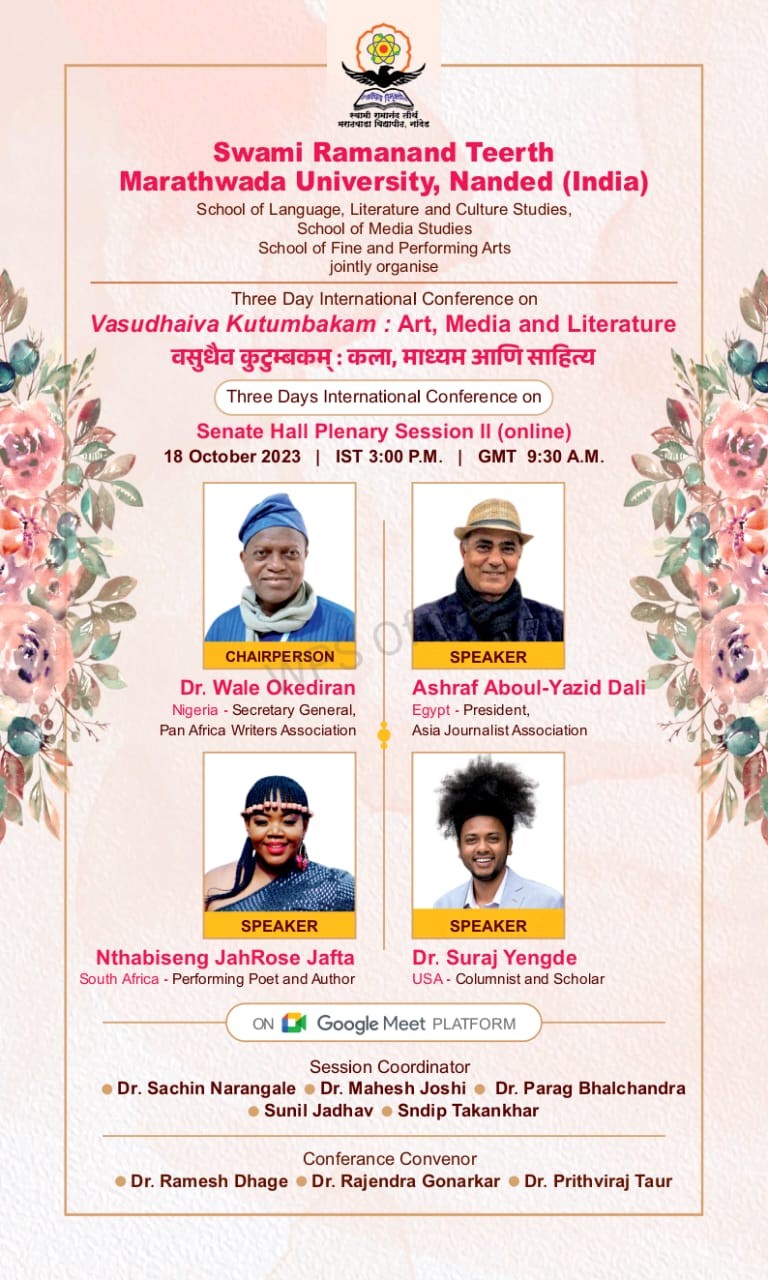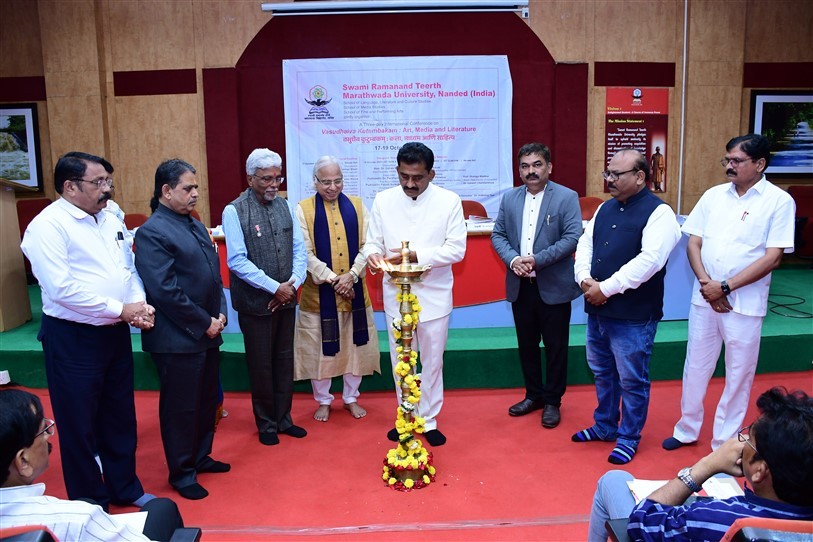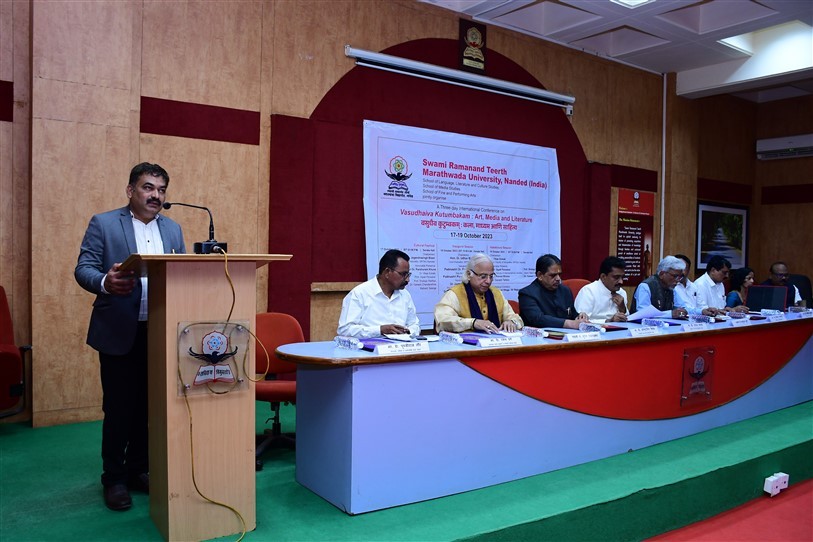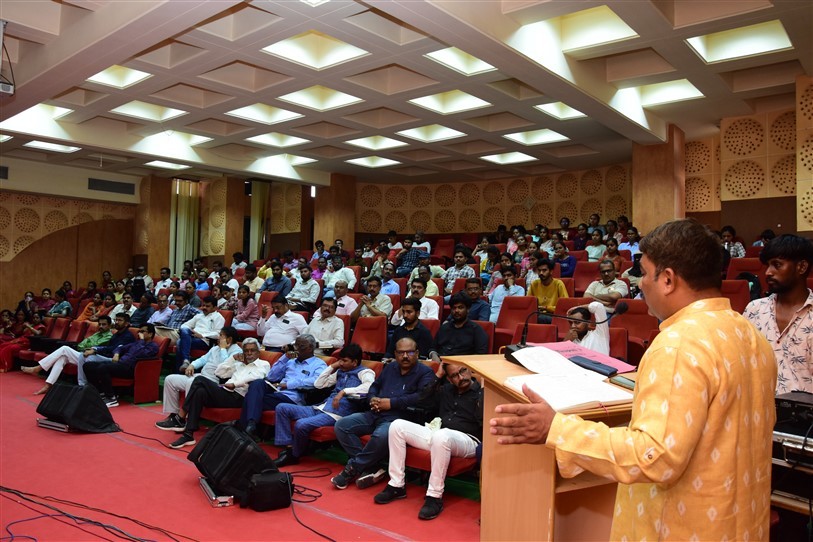Swami Ramanand Teerth Marathwada University, Nanded, India, School of Language, Literature and Culture Studies, School of Media Studies and School of Fine and Performing Arts jointly organized 3-Day International Conference on “Vasudhaiva Kutumbakam”: Art, Media and Literature, from 17 to 19 October 2023.
Vasudhaiva Kutumbakam is a Sanskrit phrase found in Hindu texts such as the Maha Upanishad, which means "The World Is One Family". The idea of the phrase remains relevant today as it emphasizes a global perspective, prioritizing the collective well-being over individual or family interests. It encourages thinking about the welfare of others, fostering global solidarity and responsibility, especially in addressing crucial issues like climate change, sustainable development, peace, and tolerance of differences. I read my paper during the Plenary Session II (online), with Chairperson Dr. Wale Okediran, Nigeria, Secretary, Pan Africa Writers Association, Nthabiseng JahRose Jafta, South Africa and Dr Sachin Narangale (linguistics academic and the conference Co-Convenor).
A Poetic Voice from South Africa
In her essay, she said that the world is one vast tapestry of cultures, languages, and experiences, woven together through the threads of art, media, and literature. It is a beautiful, diverse, and intricate quilt where every story, every brushstroke, every word contributes to the rich mosaic of our global family where borders and barriers often separate us, it is the profound belief that we are, indeed, one global family that gives us hope and sustains our shared humanity. She invite us all to journey with her through the realms of creativity, expression, and connection as we explore how art, media, and literature bind us together as one:
“My name is Nthabiseng JahRose JaAa, and today, I stand before you as an advocate for the power of unity through diversity, a concept deeply rooted in the core of my being. I hail from the scenic landscapes of South Africa's Free State, a region rich in both cultural heritage and natural beauty. In my role as a Publishing Coordinator at the University of the Free State's
African Languages Press, my mission is to expand the African Languages catalogue and ensure that the diverse voices of Africa resonate far and wide. Furthermore, as the co-founder of Sun Peo, a platform that has birthed 40 publications spanning poetry, prose, and translated works, I have had the privilege of experiencing the undeniable unity that Art, Media, and Literature can foster. I am an International Performing Poet, Author, and Festival Curator. I hold a Master's degree in Creative Writing and have been honored with a Eurasian silver medalist recognition at the "LIFFT - 2023" festival held in Egypt.”
Wolves, Dogs and Arabic Literature
In my paper, I examined how the inclusion of objects in poetry and literature has evolved over the ages, revealing their symbolic and thematic equivalents. There is no doubt that, in Arabic literature, we mention that the first example that embodies the presence of animals in written texts comes through the book Kalila and Dimna, and coincidentally, it is a translated text, signed by Abdullah bin Al-Muqaffa, which came through his translation into Arabic in the eighth century of the Indian book Panjatantra, which dates back to approximately the year 300 AD. After spanning global examples, I chose to focus on modern examples of bringing two animals in Arabic texts; wolves and dogs! I highlighted one of the amazing poetic books in recent years, “The Wolf’s Concerto” by Syrian Poet Hani Nadeem. Thus, between the treachery of the wolf that poets sang about, and the loyalty of the dog that society hesitated to accept, the dialectic of the animal’s presence in Arabic literature appears. This dialectic inspires writers throughout the ages, whether inspiration is based on mythology, history, or religious literature.
Language as a Human Being
Dr. Sachin Narangale devoted his focus on language, its use and the ways it becomes a social bridge to connect people. SF Language shows a high degree of continuity and the impressive expansion of its progress in new areas with new ideas and new directions. Like the complexity of language itself, it is a complex adaptive system, permeable to its environment and metastable in a sense of continuity while addressing the new problems of discipline and community at large, for e.g.: Eco-linguistics and Neuro- semiotics. He also gave attention of translation and its importance in new world: “In translation and interpreting, it makes sense to "problematize the disciplinary nature and provenance of SFL". Two points to support the argument:, as SFL is being used and developed in a range of distinct disciplines: of language, education, information science, translation studies, professionals in various fields associated with language and communication and SFL has not only survived (against America sponsored Chomsky's Generative Linguistics) but prospered as a powerful thing across different disciplines.
Closing Remarks
Dr. Wale Okediran, Chairman, has his closing remarks: “I will like to thank the Organizers, all our Guest Speakers, and members of the audience both physical and online for making this event a successful one. Our Speakers have done very well. In her submission, JahRose Jaffa emphasized how she has been able to use her creative skill to build bridges with several part of the world including Egypt where she was honored with a Silver medal award last year for her works. Mr Ashraf Aboul-Yazid spoked largely on the role of animals in Arabic folktale and their significance in Arabic, African and Global Literature. Finally, the third Speaker, Prof Sachin Narangale gave a deep analysis of Language and Linquistics with the conclusion that the study of Language is a part of social process. In rounding up this very impressive Panel Discussion, it is important for me to say a few words on how Art, Media and Literature can be used to promote positive changes in the society. A School of Thought led by writers such as Keats, Tennyson, TS Eliot as well as Tagore among others believed that Arts must only be used for entertainment and not to propagate social ideas. It was the belief of this class that once Art is used for social ideas, it becomes mere propaganda.
On the other hand, another School of Thought populated by Writers such as Dickens, Tolstoy, Dostoyevsky, Sharat Chandra among others believed that Art and Literature must serve the people in their struggle for a better life. Another important issue is the belief by some people that creatives are becoming more and more obsessed with commercialization to the detriment of quality of their creative content.
Regarding the Media, it is on record that the Media was originally born as an organ to defend the people against feudal oppression. Unfortunately, there is the belief today that the media has abdicated this role and has now become a tool of oppression to the people. In addition, the Media in the quest of the 'New World Order' with its Digital and Social media has been become a haven for the propagation and dissemination of fake news. It is for the above reasons that there has been a strident call for urgent legislation to curb the power of the Social Media. From the foregoing, it is now obvious that for the Art, Media and Literature to remain relevant in the lives of people, there is a strong and urgent need for all creatives to practice their trade with a sense of commitment to humanity and service.”
Performing Arts
The 3 day conference, was inaugurated by art, such as Lavani, a folk dance of Maharashtra, India was presented. There were also other musical and instrumental shows to amuse the audience, organized by the organising committee of Rajendra Gonarkar (Convenor) , Prof. Ramesh Dhage (Org. Secretary) , Dr Prithviraj Taur (Convenor), Dr Sachin Narangale (Co-Convenor), Dr Nina Gogate (Co-Convenor) , Mr Kiran Savant (Co-Convenor) , Prof. Dipak Shinde, Prof. Dilip Chavan, Prof. Shailaja Wadikar, Dr Suhas Pathak. Dr P. Vitthal, Dr Vaijanath Anamulwad, Dr Yogini Satarkar, Mr Mohd Zishan Ali, Dr Mahesh Joshi, Dr Parag Bhalchandra, Dr Anuradha Patki, Dr Shivraj Shinde, Mr Rahul Gaikwad, Mr Kailash Pupulwad, Mr Prashant Bompilwar, Mr Namdev Bompilwar, Mr Abhijit Waghmare, Mr Sunil Jadhav, Mr Sandip Takhankar and Mr Pradnyakiran Jamdade.




Comments